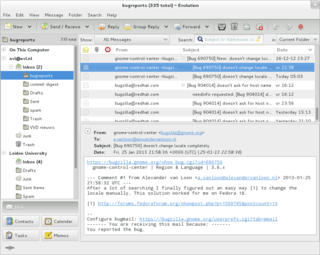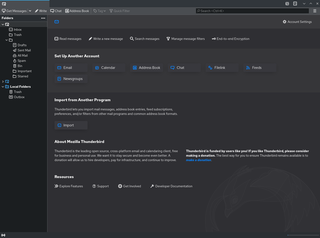
Electronic mail is a method of exchanging messages ("mail") between people using electronic devices. Email was thus conceived as the electronic (digital) version of, or counterpart to, mail, at a time when "mail" meant only physical mail. Email later became a ubiquitous communication medium, to the point that in current use, an e-mail address is often treated as a basic and necessary part of many processes in business, commerce, government, education, entertainment, and other spheres of daily life in most countries. Email is the medium, and each message sent therewith is called an email.
The Simple Mail Transfer Protocol (SMTP) is an internet standard communication protocol for electronic mail transmission. Mail servers and other message transfer agents use SMTP to send and receive mail messages. User-level email clients typically use SMTP only for sending messages to a mail server for relaying, and typically submit outgoing email to the mail server on port 587 or 465 per RFC 8314. For retrieving messages, IMAP is standard, but proprietary servers also often implement proprietary protocols, e.g., Exchange ActiveSync.

An email client, email reader or, more formally, message user agent (MUA) or mail user agent is a computer program used to access and manage a user's email.
HCL Notes and HCL Domino are the client and server, respectively, of a collaborative client-server software platform formerly sold by IBM, now by HCL Technologies.
Webmail is an email service that can be accessed using a standard web browser. It contrasts with email service accessible through a specialised email client software. Examples of webmail providers are 1&1 Ionos, AOL Mail, Gmail, GMX Mail, Mailfence, Outlook.com/Hotmail.com, Yahoo! Mail and IceWarp Mail Server. Additionally, many internet service providers provide webmail as part of their internet service package. Similarly, some web hosting providers also provide webmail as a part of their hosting package.

Microsoft Outlook is a personal information manager software system from Microsoft, available as a part of the Microsoft Office suite. Though primarily an email client, Outlook also includes such functions as calendaring, task managing, contact managing, note-taking, journal logging and web browsing.
Eudora is an email client that was used on the classic Mac OS, Mac OS X, and Microsoft Windows operating systems. It also supported several palmtop computing platforms, including Newton and the Palm OS. In 2018, after being years out of print, the software was open-sourced by the Computer History Museum.

SquirrelMail is a project that aims to provide both a web-based email client and a proxy server for the IMAP protocol.
Calendaring Extensions to WebDAV, or CalDAV, is an Internet standard allowing a client to access and manage calendar data along with the ability to schedule meetings with users on the same or on remote servers. It lets multiple users in different locations to share, search and synchronize calendar data. It extends the WebDAV specification and uses the iCalendar format for the calendar data. The access protocol is defined by RFC 4791. Extensions to CalDAV for scheduling are standardized as RFC 6638. The protocol is used by many important open-source applications.
The following tables compare general and technical features of notable email client programs.

Zimbra Collaboration, formerly known as the Zimbra Collaboration Suite (ZCS) before 2019, is a collaborative software suite that includes an email server and a web client.
The Sun Java System Calendar Server was Sun's calendar (scheduling) server. The currently available version is 6.3 which is now part of the Sun Java System Communications Suite.

hMailServer is a free email server for Windows created by Martin Knafve. It runs as a Windows service and includes administration tools for management and backup. It has support for IMAP, POP3, and SMTP email protocols. It can use external database engines such as MySQL, MS SQL or PostgreSQL, or an internal MS SQL Compact Edition engine to store configuration and index data. The actual email messages are stored on disk in a raw MIME format. It has active support and development forums.

Outlook.com is a personal information manager web app from Microsoft consisting of webmail, calendaring, contacts, and tasks services. Founded in 1996 by Sabeer Bhatia and Jack Smith as Hotmail, it was acquired by Microsoft in 1997 for an estimated $400 million and relaunched as MSN Hotmail, later rebranded to Windows Live Hotmail as part of the Windows Live suite of products. Microsoft phased out Hotmail in October 2011, relaunching the service as Outlook.com in 2012.
Zarafa was an open-source groupware application that originated in the city of Delft in the Netherlands. The company that developed Zarafa, previously known as Connectux, is also called Zarafa. The Zarafa groupware provided email storage on the server side and offered its own Ajax-based mail client called WebAccess and a HTML5-based, WebApp. Advanced features were available in commercially supported versions. Zarafa has been superseded by Kopano.

QIP is a multiprotocol instant messaging client. It is a closed source freeware program originally developed by Ilgam Zyulkorneev. In 2008 it was bought by RosBusinessConsulting media group and named most popular RBC service in 2009.
Ipswitch IMail Server is an email server application with groupware functionality that runs on Microsoft Windows OS. It was developed in 1994 by Ipswitch, Inc., a software company based in Lexington, Massachusetts.

GroupWise is a messaging and collaboration platform from Micro Focus that supports email, calendaring, personal information management, instant messaging, and document management. The GroupWise platform consists of desktop client software, which is available for Windows,, and the server software, which is supported on Windows Server and Linux.
MailEnable is a Windows-based, commercial email server distributed by MailEnable Pty. Ltd, an Australian-based software company which was established in 2002.
The JSON Meta Application Protocol (JMAP) is a set of related open Internet Standard protocols for handling email. JMAP is implemented using JSON APIs over HTTP and has been developed as an alternative to IMAP/SMTP and proprietary email APIs such as Gmail and Outlook. Additional protocols and data models being built on top of the core of JMAP for handling contacts and calendar synchronization are meant to be potential replacements for CardDAV and CalDAV, and other support is currently in the works.








